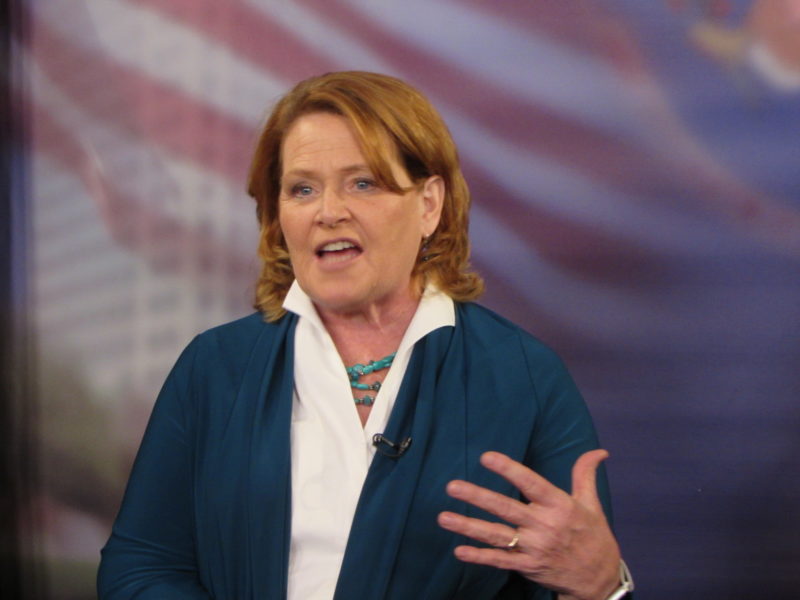Nearly 20 years ago, U.S. Sen. Heidi Heitkamp was diagnosed with breast cancer during her run for governor of North Dakota.
She continued her gubernatorial bid while undergoing treatment for the aggressive cancer and serving as the state’s attorney general. Through it all, Heitkamp remained positive and determined to beat the disease.
“There was always hope that I could survive, so I was determined to believe I could,” Heitkamp said.
She shared her story at the second annual United in Hope luncheon in Fargo. Proceeds from the event benefit the Edith Sanford Breast Initiative at Sanford Roger Maris Cancer Center.
Battling cancer in the public eye
Heitkamp was diagnosed on Sept. 15, 2000, at 44 years old. Having lost her father to melanoma when she was just 26, Heitkamp was a strong proponent of screening. She never missed her routine mammogram, but her breast cancer still went undiagnosed.
“You definitely have a better sense of how losing someone that young affects their children,” Heitkamp said. “My father wasn’t at my wedding and never met my kids. As a parent, you think about all the things you are going to miss and all the things your family is going to miss.”
After hearing the words “breast cancer,” Heitkamp didn’t dwell on the difficult road ahead navigating a contentious campaign and battling cancer in the public eye. She instead thought of her 14-year-old daughter, Ali, and 10-year-old son, Nathan.
“The most difficult part was seeing my family struggle and knowing how scared they were,” Heitkamp said.
Heitkamp announced to the public she had breast cancer just five days after her diagnosis and underwent a mastectomy the next week. After a short recovery, she was back on the campaign trail and soon started chemotherapy.
“It was hard to go through cancer in such a public way, but I really believe it had a huge effect on my ability to survive cancer,” Heitkamp said. “I had everyone in North Dakota saying a prayer for me. Whether they voted for me or not, they were pulling for me to survive cancer.
“Because of that, I was able to put one foot in front of the other and actually survive this disease.”
Making the best of the time she has
Heitkamp’s cancer has been in remission for nearly two decades. But surviving the disease has helped shape her career ever since, including her term as North Dakota’s first female U.S. Senator from 2012 to 2018.
“You don’t know how much time you have on this earth, so you have to use your time the best you can and live up to the standards you set for yourself,” Heitkamp said. “As a senator, I did things based on what I thought was best for North Dakota and for the country even when it was politically risky.”
She’s proud of her accomplishments including working to lift export bans and support farmers and the coal industry. She advocated for Native American women and children and helped pass a bill to mint a Breast Cancer Awareness commemorative coin.
Continuing the fight
Even as Heitkamp has seen cancer care progress in the time since her diagnosis, she still sees the need to fight this devastating disease.
“Cancer takes far too many of us,” Heitkamp said. “We’ve seen more survivors of cancer, but that doesn’t mean we’ve won.”
The battle against cancer continues at Edith Sanford at the Sanford Roger Maris Cancer Center where 335 breast cancer patients were treated in 2018. Generous donors and funds raised at events like the United in Hope luncheon support:
- Research to identify specific treatments that will work best for each woman, prevent breast cancer on an individual basis and ultimately eradicate the disease.
- Integrative medicine to care for patients not just physically but emotionally and spiritually with Reiki therapy, reflexology, massage and mindfulness.
- Navigation services to support patients through every step of the cancer journey from diagnosis to treatment to survivorship.
- Survivorship programs and retreats to help patients explore renewal, find encouragement and gain knowledge in a comforting space, surrounded by those who understand.
- Art therapy to promote stress relief and distraction from fear and provide an avenue of expression through various forms of art.
- Pet therapy to reduce pain, anxiety, depression and fatigue for patients undergoing and recovering from cancer treatment.
Read more
- Taking cancer survivorship care to the next level, for all
- Cancer survivor shares importance of 3D mammography
- Preschooler born with cancer now works at being a kid
…
